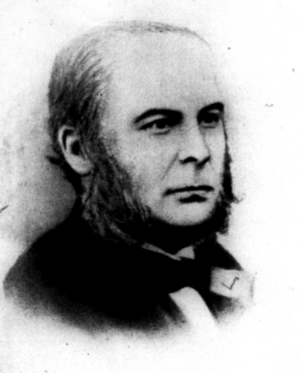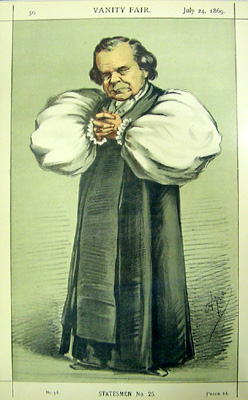Essays and Reviews facts for kids
Essays and Reviews was a book published in March 1860. It was edited by John William Parker. This book contained seven essays about Christianity. The essays explored new ideas about the Bible, how people thought about religion in England, and the story of creation in the Book of Genesis.
Essays and Reviews was a common book title back then. Many books had similar names, but this one made a huge impact!
Contents
Who Wrote It?
Six church leaders from the Church of England and one non-church person wrote the essays. Each writer chose their own topic. There was no main editor telling them what to write.
Some of the important writers were:
- Frederick Temple: He later became a very important church leader, the Archbishop of Canterbury.
- Rowland Williams: A teacher at Cambridge.
- Baden Powell: A clergyman and professor at Oxford. (Not the founder of the Boy Scouts!)
- Henry Bristow Wilson: A fellow at St John's College, Oxford.
- Mark Pattison: A teacher at Lincoln College, Oxford.
- Benjamin Jowett: A fellow at Balliol College, Oxford, and a Greek professor.
- Charles Wycliffe Goodwin: A lawyer and expert on ancient Egypt. He was the only non-church writer.
Why Was This Book Important?
This book was very important because of when it came out and who wrote it. It was published just four months after Charles Darwin's famous book, On the Origin of Species.
Essays and Reviews brought together many new ideas that had been challenging old ways of thinking about the Bible.
- Some scholars, called "higher critics," had been studying the Bible's history in new ways.
- Scientists were also making new discoveries in geology (the study of Earth's rocks) and biology (the study of living things). These discoveries sometimes seemed to conflict with the Bible's creation story.
Baden Powell wrote in the book that God created the world with natural laws. He argued that miracles (events that break natural laws) don't fit with this idea. He also said that Darwin's Origin of Species would "soon bring about an entire revolution" in how people thought about nature.
The book caused a big debate. It showed that both traditional church views and more open-minded religious ideas were facing challenges. It also marked the start of a time when many people began to have doubts about religion.
What Were the Seven Essays About?
Here's a quick look at what each essay discussed:
- The Education of the World by Frederick Temple: This essay encouraged people to study the Bible freely and openly.
- Bunsen's Biblical Researches by Rowland Williams: This essay questioned whether all Old Testament prophecies were meant to predict future events.
- On the Study of the Evidences of Christianity by Baden Powell: This essay openly stated that miracles were not possible.
- Séances Historiques de Genève. The National Church by Henry Bristow Wilson: This essay gave a very broad meaning to the Church of England's beliefs and questioned the idea of people being damned forever.
- On the Mosaic Cosmogony by C. W. Goodwin: This essay looked at how the creation story in Genesis didn't quite match up with new discoveries in geology.
- Tendencies of Religious Thought in England, 1688-1750 by Mark Pattison: This was a detailed study of religious thinkers from the 1700s.
- On the Interpretation of Scripture by Benjamin Jowett: He argued that the Bible should be read "like any other book." He also strongly asked for more freedom for scholars to study and interpret the Bible.
What Happened Next?
The ideas in Essays and Reviews caused a huge uproar. Even though today these ideas might seem normal, back then, many people called them heresy (beliefs that go against official church teachings). The writers were even called "The Seven Against Christ."
Two of the authors, Rowland Williams and Henry Bristow Wilson, were accused of heresy in a church court. They were found guilty on some charges. However, they appealed their case to a higher court, the Judicial Committee of the Privy Council.
In 1864, this higher court overturned their convictions. This meant they were found not guilty. It was famously said that the Privy Council had "dismissed hell with costs," meaning they ruled against the idea of eternal damnation.
This decision made many people angry. Over 137,000 ordinary church members signed a letter thanking the Archbishops who had voted against the court's decision. About 11,000 clergy (church leaders) also signed a statement supporting the traditional view of the Bible and eternal punishment.
Finally, a church meeting called the Convocation of Canterbury officially condemned Essays and Reviews in June.
See also
 | Valerie Thomas |
 | Frederick McKinley Jones |
 | George Edward Alcorn Jr. |
 | Thomas Mensah |



